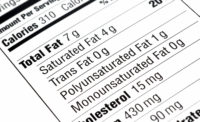Women are 14 percent more likely than men to select environmentally-friendly packaging over "non-green," more-convenient alternatives, according to a recent study of 1,011 adults commissioned by Thomson Reuters' IP Solutions business, New York, N.Y. Officials said Men surveyed were more apt to select products packaged to provide greater convenience.
This finding is part of an intellectual property report released by Thomson Reuters, World IP,Today: Convenience vs. Conscience – Food Packaging in the 21st Century,which explores trends and drivers in the food packaging industry. Study authors say their analysis assesses the state of food- and beverage-packaging innovation across a number of information sources, including patents, trademarks, scientific literature and litigation data.
Key findings from the report include:
*Convenience vs. Conscience – a tie: In the great "convenience versus conscience debate," people are fairly evenly split between environmental conscience and consumer convenience when it comes to making food- and beverage-packaging decisions. The industry is headed in the direction of providing both convenient packaging and conscientious protection of the environment, satisfying both needs rather than making it an either/or decision.
*Consumer-facing companies top leader lists: Companies such as Procter & Gamble, Kraft Foods and Mars Inc. are the top B2C (business-to-consumer) filers of design patents in terms of their packaging innovation; while others such as Reynolds, Solo Cup Company and Nestle are the leading consumer product companies filing for protection of packaging-related trademarks. The top B2B (business-to-business) packaging innovators who supply the consumer product companies include Dianippon Printing, Toppan Printing and Yoshino Kogyosho (Yoshino Plastics).
*Green labeling "loophole": While patents mentioning biodegradability, recycling and barrier films are increasing in frequency, a lack of standardization in what constitutes an environmentally-friendly package has resulted in ambiguity as to which packages really are "green." With organizations including the US Federal Trade Commission, US Sustainable Packaging Coalition and the European Organization for Packaging and the Environment currently working on standards, this issue will likely receive more attention in coming months.
* Looking ahead – interactive packaging:Beyond the "green" theme, other key areas of focus showing up in the Thomson Reuters analysis are innovations in tamper-evident packaging and interactive packages that use RFID technology to track food from source to destination.
"Analysis in the Convenience vs. Conscience – Food Packaging in the 21st Centuryreport shows the insight that can be gleaned from studying intellectual property information and related scientific-journal data," said Susan Cullen, Ph.D., Thomson Reuters IP practice director and co-author of the report. "It is our hope that readers will see the unique perspective IP data provides and look to it when making business decisions and trying to understand an area more clearly."
To view the full report, World IP Today: Convenience vs. Conscience – Food Packaging in the 21st Century, go to http://ip.thomsonreuters.com/FoodReport2011/.
Get our new eMagazine delivered to your inbox every month.
Stay in the know on the latest food and beverage manufacturing markets.
SUBSCRIBE TODAYCopyright ©2024. All Rights Reserved BNP Media.
Design, CMS, Hosting & Web Development :: ePublishing
